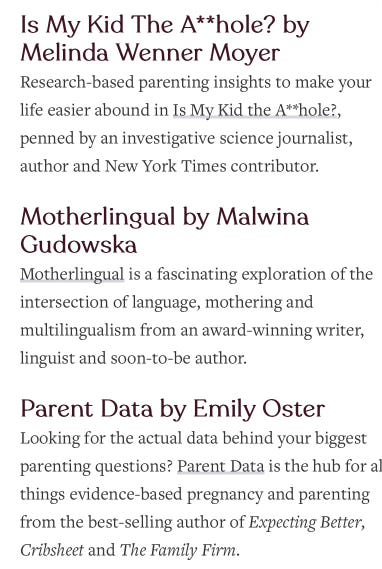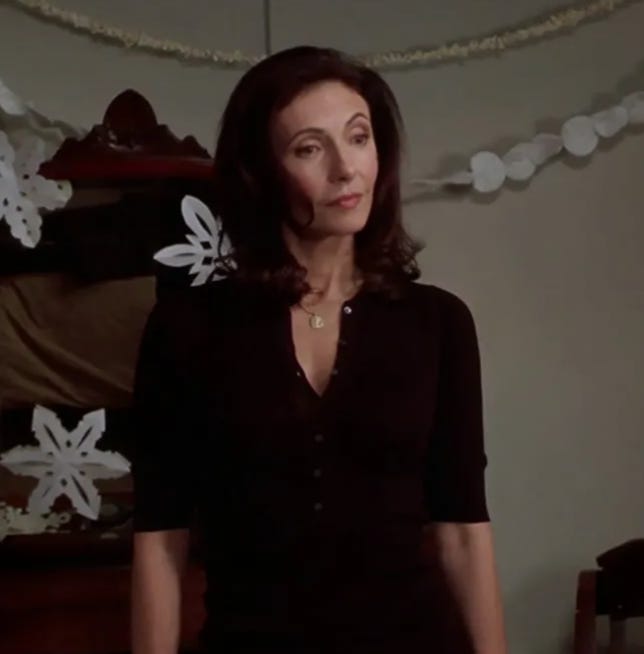Slow Return
Best way to start 2024 and some movie mom magic
I am excited to get back to writing here. Hello to the new faces and thank you everyone for your patience as I took a few weeks off to finish my book. I submitted the full draft last week and it felt amazing but also, strange, emotional, scary and even a bit anticlimactic—all normal, I hear. I am about to tackle edits this week, so calling this a “slow return” in case I need to step away again for a moment before returning to regular programming.
Now, on to a few things I wanted to share from the past few weeks. Amid ten-hour writing days a few weeks ago that coincided with a case of post-Christmas blues, I got some great news. The wonderful Motherly and Jessica D’Argenio Waller, Motherly’s health and wellness editor, named this little newsletter one of “9 parenting Substacks worth your precious inbox space”:
“From gorgeous words of wisdom to maternal health news, children’s book roundups to top-notch reporting, here are the parenting Substacks that fill us up, help us feel seen and make our inboxes an actual delight to open.”
“Motherlingual is a fascinating exploration of the intersection of language, mothering and multilingualism from an award-winning writer, linguist and soon-to-be author.”
That would have been plenty to celebrate because I love Motherly and I am truly honoured by every single recommendation and kind word about my writing and this newsletter. But then, I saw the eight other Substacks on the list and was floored. There was my newsletter sandwiched between
and !I also share the honours with one of my favourite newsletters,
as well as and Thank you again Motherly! Read the full article here.We took down our Christmas tree this weekend and although I am grateful for having the space back in our small London flat, I miss the lights and the smell already. I have complicated feelings about the holidays, but what I love most are those quiet in-between days when, if you’re lucky, you can spend a lot of time doing nothing and ideally, watching movies. We watched a lot of movies with my kids over the break and it reminded me of another thing I love to do: find the movie moms and the best mom lines. I initially started writing about five moms from the movies we saw but struggled to say anything meaningly about three of them, so they are now relegated to honourable mentions because even so, I still love each one for different reasons.
There are movie spoilers ahead so proceed with caution if that sort of thing bothers you.
Rio Morales from Spider-Man
I’ve written about Rio Morales before after watching Spider-Man: Into the Spider-Verse and the way she uses Spanish and English fluidly, translanguaging1 back and forth, and across languages with her son, Miles (a.k.a. Spiderman). Over the holidays, we finally finished Spider-Man: Across the Spider-Verse and what a visually thrilling movie. (Also, I love Hobie!) Rio is Puerto Rican and clearly has gone to great lengths to teach her son Spanish over the years. There is a great scene where she learns Miles got a B in Spanish and is predictably, shocked and angered.
I love Rio because she reminds me of every other mother trying to pass on a heritage language to a child who is dominant in English and who, although might be proficient in the other language, lives most of his life, especially the one with his peer group, in English. Rio also works long shifts as a nurse and I can’t imagine her constant worry about everything from her son’s Spanish, to her police officer partner. She is also incredibly loving and sentimental especially in the sequel. That scene where she tells Miles it is hard for her to “see my little man not be my little boy all the time” crushed me.
“For years, I’ve been taking care of this little boy. Making sure he is loved, that he feels like he belongs wherever he wants to be. He wants to go on to the world and do great big things. Not a bad kid and what I worry about most. I love you Miles. It’s just they won’t look out for you like us.”
“Where you go from here, you have to promise to take care of that little boy for me. Make sure he never forgets where he came from. And he never doubts that he’s loved.”
That hits hard. I don’t think Rio meant that he comes from Puerto Rican roots necessarily, in the stereotypically “remember where you come from” way, but more that he comes from a family that loves him and how much he was always cared for. Like almost every mom, I feel the sentiment of taking care of small children for so long that when they eventually grow up, you still worry about their little versions (or I guess some would call this the inner child).
I do wish a bit of the monologue was said in Spanish but I also get how to truly connect with Miles, Rio needs to use English, maybe not her language of the heart and the language she feels the most emotional in, but the one her son connects with most as it is his dominant language. She is using English so her son understands the depth and gravity of her emotions toward him! (I talk a lot about how and in which language—English or Polish—I express my emotions with my children in my book!)
There is a (linguistic) twist! Rio may actually even consider English her more emotional language, because a first language is not necessarily the most emotional language for everyone, especially if someone has been socialized in another language for a long time. Plus, Rio likely learnt English and Spanish simultaneously. I know, I am going deep on a fictional movie character’s linguistic identity!
Willy Wonka’s mom, played by Sally Hawkins
Over the holidays, I took my children to the theatre to seeWilly Wonka, a movie I knew very little about (it’s a prequel!) but I thoroughly enjoyed and even maybe loved a little bit. As my six-year-old recently remarked, the actor who plays Willy is “very pretty”. Yes, yes he is. (Side note: I enjoyed this article on how French Timothée Chalamet really is.)
But for the purpose of this newsletter, I want to focus on Willy’s mom, played by the great Sally Hawkins. (Sidenote, again: I have a friend who is often told she looks like Hawkins – hi C!) Willy’s mom only appears in flashbacks in the movie because she died when he was a boy, but not before making a bar of chocolate for his birthday that he still carries with him. Yes, I did ask myself, how long does chocolate last?
One more spoiler warning if you want to see Willy Wonka and hate spoilers.
Ok, ready then. Everything Willy Wonka wants to be, so, mostly just a great chocolatier, is because of his mom. He hopes when he finally achieves his goal, his dead mom will appear, or he will at least feel her presence, because she promised him she would be by his side. Just writing that makes me teary because of course there is a dead mom and a loving childhood and memories of her love driving the child’s dreams and passion. Willy Wonka does achieve his goal, and in a way, his mom is right there with him and appears briefly on-screen in a crowd to blow him a kiss from afar. Yes, I cried in the theatre.
There is a part in the movie where Willy says how he wants chocolate to taste and to make him feel the way it did when he was a child with his mom. There is something poignant about this sentiment as it relates to language. In my book, I write about affective linguistic conditioning, or when words and phrases acquire meaning often through emotionally-charged experiences and memories. This is something that comes up time and time again with multilinguals who as adults predominantly use a different language than the language of their childhoods.
Perhaps it is the way someone in the family said something to comfort them when they were children, in a language used in the home that was not the same language used in the community or country of residence. Or, it is a saying, or a song (I also write about lullabies) a mother said or sang, especially in a language they do not necessarily use anymore. It happens in monolingual families as well when we want to recreate the memory of something from our childhoods. You can see the connection Willy has with the memory of chocolate and his mother in so many other areas like music, smells and scents, but especially around food.
And when she says,
“Every good thing in this world, started with a dream. So you hold on to yours.”
Waterfalls. Moms are so good.
I leave you with the three honourable mentions from the movies we saw over the Christmas break. If you know who they are and have any strong (good of bad) feelings toward any of these moms, let me know in the comments. (Last side note: I may have gone deep in a dark googling hole looking at old photos of Mary Steenburgen. I had no idea she was once married, and has two children with Malcolm McDowell. If you have no idea what I am talking about, I envy your youth!)
Thank you for reading.
In case you are not familiar with this term, it has gained popularity and evolved over the past decade in linguistics, especially in the classroom. It represents a full linguistic repertoire so as opposed to switching between languages, it does not consider languages separate and takes an inside approach as opposed to an outside one. Rather than using language, translanguaing is about being in language, doing language, the practice of language or, “languaging”.










Awww welcome back Malwina! This was such an exciting mention for us, too, and honored to be included with you. Wishing you best for the next stages of the book process -- absolutely cannot wait to read it. 🖤
One of the many things I miss about my Japanese mom and my childhood were the times she and her Japanese friends would get together and their language was an amazing mix of mostly Japanese but also with plenty of English. They were all bilingual and easily moved between languages in conversation. I haven’t heard that music in years and I miss it.
I also remember how the moms would be in the kitchen making the holiday meal, chatting away mostly in Japanese, and if one of us kids came in because we needed/wanted something, all the moms flipped to English, got the request met and then snapped right back into their Japanese. I never appreciated how amazing that was as a child.